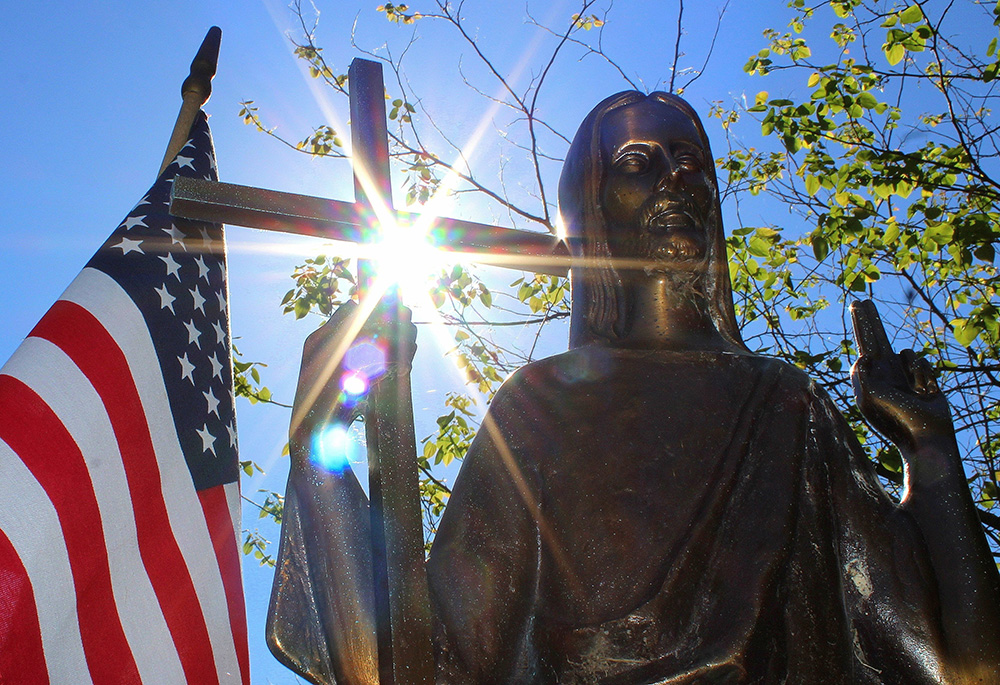
The sun shines through a statue of Christ on a grave marker alongside an American flag at St. Mary Catholic Cemetery in Appleton, Wisconsin, in this 2018 photo. (OSV News file photo/Bradley Birkholz)
President-elect Donald Trump stated he plans to end birthright citizenship, which is currently guaranteed by the 14th Amendment. The pro-life movement, which is as significant a part of the GOP base as the anti-immigrant caucus, needs to step up and oppose any attempt to end the conferral of citizenship on those born in the United States.
The foundational argument of the pro-life movement is that all life is sacred, and that once you start parsing who is, and who is not, entitled to certain rights, you are halfway down a slippery moral slope. All human beings, as human beings, should enjoy the same rights as every other human being.
The relationship of abortion policy to immigration policy might seem counterintuitive. The 14th Amendment doesn't help the pro-life cause. It refers to "All persons born or naturalized in the United States ..." Pro-choice groups argue that a human being only has a right to life once it is born, but once born, the rights that are conferred on the person are sacrosanct.
Those who drafted and enacted the 14th Amendment were not addressing the moral and legal issues surrounding abortion, and they didn't have sonograms in 1866 when members of Congress began drafting the amendment after President Andrew Johnson vetoed the Civil Rights Act that year.
The drafters of the 14th Amendment aimed to extend the equal protection of the laws to those formerly enslaved. They knew that the framers of the original Constitution had it wrong when they decreed that slaves only counted as three-fifths of a person for purposes of representation in the Congress. They knew that the founders had been wrong about slavery entirely. They knew that this diminishment of the humanity of those who had been enslaved was an affront to our nation's foundational claims about human freedom and legal equality.
The pro-life movement has always been constructed on this deeper moral concern, that no person should have their humanity diminished, even if the movement has failed to live up to this high ideal. The source of human rights is our civilizational belief in transcendent human dignity. Virtually every religion expresses this belief in some way. Ours expresses it in terms of the imago Dei, the belief that every person is made in the image of likeness of God. Every time the pro-life movement ignores other threats to this God-given human dignity, it weakens its credibility.
Advertisement
"Catholic social thought starts with the dignity of each person and the whole person," Dylan Corbett, executive director of the Hope Border Institute which advocates for immigrants, told me. "This is the bedrock of the church's commitment to the poor, the unborn and the vulnerable, without distinction. In the coming months, the Trump administration's targeting of our parishioners, neighbors and the essential workers in our communities simply because of immigration status will test the credibility of our moral witness."
Kristen Day, director of Democrats for Life of America agrees. "Pro-life principles don't end where Donald Trump's pet projects begin," she told me via email. "Remaining silent on the issue of birthright citizenship would betray our movement's highest values because there is nothing pro-life about ending it. Life begins at conception, but it doesn't end at birth."
To be clear, even a democracy seriously engaged in working for equality will need to draw distinctions, to discriminate, between people. We all know a precocious 16- or 17-year-old who is more mature than some 20-somethings we know, but unless you are 18, you don't get to vote. We wouldn't want the government devising some kind of test that decides who is worthy to vote, and who isn't, and so we set an arbitrary cutoff. That arbitrary cutoff is applied universally.
In terms of abortion policy, conception, viability and birth are the usual cutoffs, and there is an argument to be made for any of the three. Only the first coheres with Catholic teaching, and in most pluralistic democracies, the cutoff is at some point between conception and viability.
As a culture, a society and a polity, we need to learn how to think more deeply, and less arbitrarily, about where we draw such lines.
The idea that a person is a citizen of the place where he or she is born is a bulwark against any attempt to discriminate unjustly. A good way to sniff if a particular discrimination is just or unjust is to ask whether it is universal. Birthright citizenship is universal: It applies to everyone born here.
This political linkage of immigration and abortion cuts both ways. Pro-immigrant arguments would have greater moral cogency to many Americans if they were put forward by people who are committed to protecting the lives of unborn children, or at least not indifferent to the dignity of those unborn children. Given the polarization of the country, that moral linkage is not apparent to most and will be dismissed by many. Still, moral coherence eventually wins out most of the time.
At this moment in our nation's political history, the pro-life movement should rally around the cause of defending birthright citizenship.








